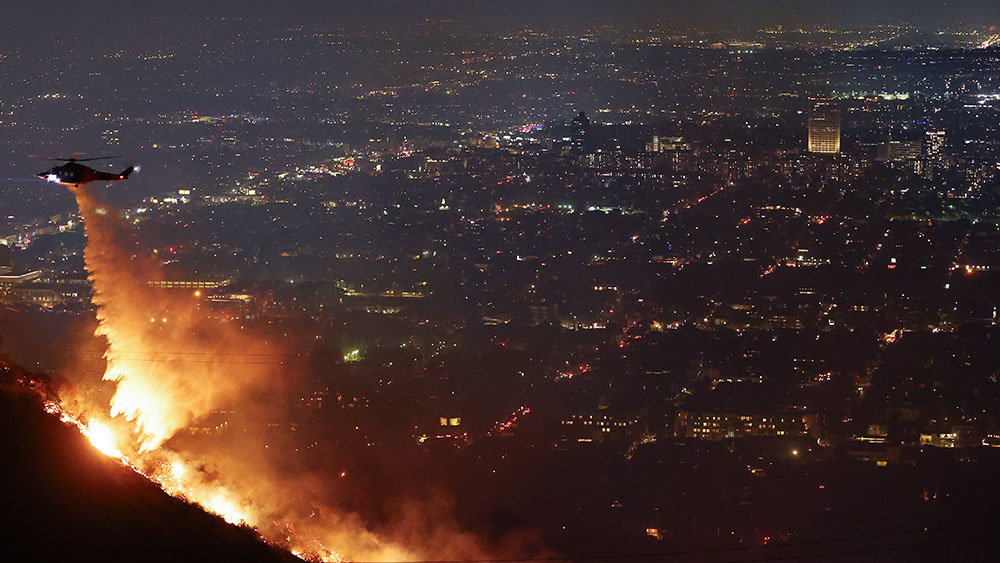
- The wildfires in Los Angeles have caused catastrophic damage, claiming at least 10 lives, destroying nearly 10,000 structures and consuming over 34,000 acres.
- Over 153,000 residents have been forced to evacuate, with another 166,800 under evacuation warnings.
- Firefighters are struggling to contain the blazes, with only eight percent of the Palisades Fire contained and the Eaton Fire at zero percent.
- The fires have created a public health crisis, with toxic smoke blanketing the region and exposing millions to hazardous air quality.
- President Joe Biden declared the fires a major disaster, promising federal aid. However, concerns about equitable resource allocation and fair insurance compensation persist.
The wildfires ravaging Los Angeles have left a trail of devastation, claiming at least 10 lives, destroying nearly 10,000 structures and forcing tens of thousands to flee their homes. As the fires rage on, the situation remains dire, with dry desert winds fueling the flames and complicating firefighting efforts.
The Palisades Fire, near Santa Monica and Malibu, and the Eaton Fire, near Pasadena, have already etched their names in history as the most destructive wildfires Los Angeles has ever seen.
The scale of destruction is staggering. Over 34,000 acres – roughly 53 square miles – have been consumed by the flames, turning vibrant neighborhoods into smoldering ruins. Entire blocks have been reduced to ash, with brick chimneys and charred vehicles standing as haunting reminders of what once was.
Los Angeles County Sheriff Robert Luna described the scenes as resembling an atomic bomb blast, warning that the death toll is likely to rise as search and rescue operations continue.
The human cost of these fires is immeasurable. Families have lost homes, livelihoods, and loved ones.
The economic toll is equally staggering, with private forecaster AccuWeather estimating damages between $135 billion and $150 billion. This catastrophic loss portends a long and arduous recovery, compounded by the likelihood of skyrocketing homeowners' insurance costs.
A city in flight
As the fires spread, tens of thousands of residents have been forced to evacuate, leaving behind everything they hold dear. Mandatory evacuation orders have displaced over 153,000 people, with another 166,800 under evacuation warnings.
The sheer scale of displacement has overwhelmed local resources, with shelters struggling to accommodate the influx of evacuees.
The evacuation process has been chaotic at times. On Jan. 9, Los Angeles County mistakenly sent a countywide evacuation notice to 9.6 million residents, but it was intended only for those near the rapidly expanding Kenneth Fire near Calabasas.
While officials quickly corrected the error, the incident underscored the tension and fear gripping the region.
For many, the decision to leave was agonizing. Some, like John Carr, a 65-year-old Pacific Palisades resident, chose to stay behind to protect their homes.
Carr, who successfully defended his family home built in 1960, lamented the lack of firefighting resources in his neighborhood. "If they had had some fire trucks and just put a squirt here, a squirt there and kept an eye on things, all these houses would be here now," said Carr.
Others returned to their neighborhoods only to find devastation. In Pacific Palisades, once-luxurious homes now stand in ruins, with downed power lines and abandoned cars strewn all over the streets.
Bilal Tukhi, a private security guard, compared the scene to his war-torn homeland of Afghanistan. Standing outside his employer's damaged home, Tukhi is still grateful because they are still alive, which is "all that matters."
A race against time
Firefighters are battling the blazes on multiple fronts, but the odds are stacked against them. The Palisades Fire, the largest of the five active wildfires, is only eight percent contained, while the Eaton Fire remains zero percent contained.
Aerial support has been critical, with aircraft dropping water and fire retardant on the flames. However, the efforts have been hampered by strong winds and logistical challenges.
A large Super Scooper aircraft on loan from Canada was damaged and grounded after colliding with an unauthorized civilian drone near the Palisades Fire. The incident highlights the dangers posed by unauthorized drone activity, which can disrupt firefighting operations and put lives at risk. (Related: Adam Carolla lambasts Democrats over handling of California fires, predicts liberals will flee.)
Firefighters from across the U.S. and Canada have joined the battle, bolstering local crews. Canadian Prime Minister Justin Trudeau pledged his country's support, saying, "To our American neighbors: Canada's here to help."
But despite these reinforcements, the sheer scale of the fires and the unpredictable weather conditions have made containment efforts a herculean task.
The road ahead
The road to recovery will be long and fraught with challenges. Rebuilding homes, restoring communities and addressing the psychological scars left by the fires will require sustained effort and resources.
As of writing, at least 13 people have been reported missing in Los Angeles County while the fires have been raging in the area, reported Luna. He added that it remains to be seen if all of the missing persons reports are related to the fires.
Luna added that 40 members of the Search and Rescue Task Force will be looking for the missing people and remains. He also advised that because of safety concerns, they "are unable to safely search the impacted areas during the hours of darkness, so this will only be taking place while there’s light."
For now, the focus remains on containing the flames and protecting lives. As the winds shift and the fires continue to burn, the resilience of Los Angeles and its people will be tested like never before.
In the face of unimaginable loss, the city must come together to heal, rebuild and prepare for the challenges that lie ahead.
The wildfires are a tragedy, but they are also a call to action. The time to act is now – before more lives are lost, more homes are destroyed and more communities are left in ashes.
Visit Disaster.news for more updates about the California wildfires and other disasters.
Watch the full video below of "The Highwire with Del Bigtree" for more updates about the Los Angeles wildfires.
This video is from The HighWire with Del Bigtree channel on Brighteon.com.
More related stories:
Democratic leadership failures exposed as Los Angeles burns.
Arson suspected as wildfires ravage Los Angeles; Santa Monica caught in chaos.
Armageddon: While Cali burns to the ground, thugs are looting like banshees…
Sources include:
Please contact us for more information.















